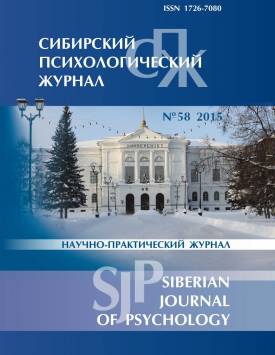Existential sets of landscape-oriented psychotherapy
In this article, we offer the project of landscape-oriented therapy in the context of a practicing psycholo-gist's tasks. Actual issues that a practicing psychologist faces, such as the relationship between "environment" and "landscape", the meaning of the term "landscape", correlations of landscape and specific subjects of therapy, and the logistics of communication between a therapist and a client, are solved in the context of existential sets of humanistic psychotherapy. We make the interpretation of the environment as a field of relationships of a person subjectified in subjectivity (understood as a person's ability to produce a "place of life"). We introduce the term "the place of life" as a semantic unit of landscape, and we specify it in the following statements. First, landscape is the view, an organizing image. Second, a body is an image of a person; his behavior, thoughts and feelings are his space of living. Third, subjectivity is the time, the logos-rhythm, the energy of the experience of living, that, at the end turns into an ideal form of landscape. Subjectivity has a meaning of environmental identification criterion and is able to translate the environment into the landscape due to the sense formation turned into a symbol. As a result, we define landscape as the space-time of the subject of life, his existence-world held together and outlined by subjectivity, and at the same time, coinciding with subjectivity, manifesting the subject of life in behavior, a thought, a feeling. We examine interrelated factors of landscape-oriented psychotherapy, based on the body problematisation in the sense of existentialism. These are the landscape factor; the path factor; the surprise factor; the non-verbal client's plan factor; the factor of metaphor; the factor of the conversation between "two strangers"; the factor of client's life experience; and the factor of archetype.
Keywords
субъективность, бытие, среда, ландшафт, тело, организм, субъект жизни, психотерапия, индивид, индивидуальность, личность, subjectivity, being, environment, landscape, body, organism, subject of life, psychotherapy, individual, individuality, personalityAuthors
| Name | Organization | |
| Teslya Svetlana N. | Sochi state University | Wayness@yandex.ru |
References

Existential sets of landscape-oriented psychotherapy | Sibirskiy Psikhologicheskiy Zhurnal – Siberian Journal of Psychology. 2015. № 58.
